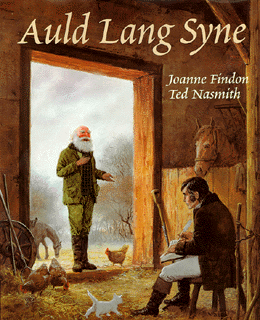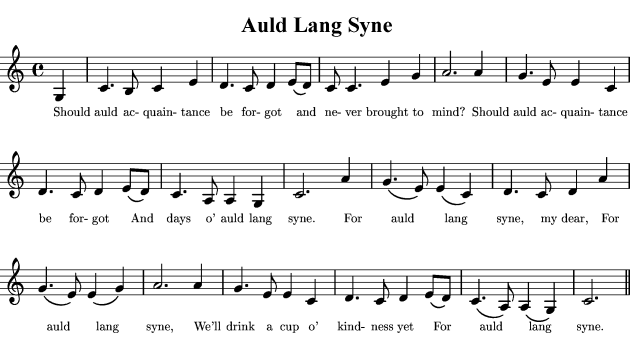
In any case, it is one of the better-known songs in English-speaking countries, and it is often sung at the stroke of midnight on New Year's Day. Like many other frequently sung songs, the melody is better remembered than the words, which are often sung incorrectly, and seldom in full.
"Auld Lang Syne" is usually sung each year at midnight on New Year's Day (Hogmanay in Scotland) in the United Kingdom, the Republic of Ireland, the United States, Australia, New Zealand, South Africa, Hong Kong, Anglo areas of India, and Canada, and signifies the start of
a new year. In the United Kingdom, it is played at the close of the annual Congress (conference) of the Trades Union Congress.

"Auld Lang Syne" (Scots pronunciation: [ˈɔːld lɑŋˈsəin]: note "s" rather than "z")[1] is a Scottish poem written by Robert Burns in 1788[2] and set to the tune of a traditional folk song (Roud # 6294). It is well known in many English-speaking (and other) countries and is often sung to celebrate the start of the New Year at the stroke of midnight. By extension, its use has also become common at funerals, graduations, and as a farewell or ending to other occasions.
The song's Scots title may be translated into English literally as "old long since", or more idiomatically, "long long ago"[3] or "days gone by" or "old times' sake". The phrase "Auld Lang Syne" is also used in similar poems by Robert Ayton (1570–1638), Allan Ramsay (1686–1757), and James Watson (1711) as well as older folk songs predating Burns.[4] Matthew Fitt uses the phrase "In the days of auld lang syne" as the equivalent of "Once upon a time..." in his retelling of fairy tales in the Scots language.

HISTORY:
Robert Burns sent a copy of the original song to the Scots Musical Museum with the remark, "The following song, an old song, of the olden times, and which has never been in print, nor even in manuscript until I took it down from an old man".[5] Some of the lyrics were indeed "collected" rather than composed by the poet; the ballad "Old Long Syne" printed in 1711 by James Watson shows considerable similarity in the first verse and the chorus to Burns' later poem,[4] and is almost certainly derived from the same "old song". It is a fair supposition to attribute the rest of the poem to Burns himself.[5]
There is some doubt as to whether the melody used today is the same one Burns originally intended, but it is widely used both in Scotland and in the rest of the world.[6]
Singing the song on Hogmanay or New Year's Eve very quickly became a Scots custom that soon spread to other parts of the British Isles. As Scots (and other Britons) emigrated around the world, they took the song with them.
Canadian band leader Guy Lombardo is often credited with popularising the use of the song at New Year's celebrations in America, through his annual broadcasts on radio and television, beginning in 1929. The song became his trademark. In addition to his live broadcasts, Lombardo recorded the song more than once. His first recording was in 1939. A later recording on September 29, 1947 was issued as a single by Decca Records as catalog #24260.[7]
However, earlier newspaper articles describe revellers on both sides of the Atlantic singing the song to usher in the New Year:
- "Holiday Parties at Lenox" (Massachusetts, USA) (1896) – The company joined hands in the great music room at midnight and sang "Auld Lang Syne" as the last stroke of 12 sounded and the new year came in.[8]
- "New Year's Eve in London" (London, England) (1910) – Usual Customs Observed by People of All Classes… The passing of the old year was celebrated in London much as usual. The Scottish residents gathered outside of St. Paul's Church and sang "Auld Lang Syne" as the last stroke of 12 sounded from the great bell.[9]
A manuscript of "Auld Lang Syne" is held in the permanent collection of The Lilly Library at Indiana University in Bloomington, Indiana.[10]
Source:
http://en.wikipedia.org/wiki/Auld_Lang_Syne


Should auld acquaintance be forgot,
and never brought to mind ?
Should auld acquaintance be forgot,
and auld lang syne ?
And surely ye'll be your pint-stoup !
And surely I'll be mine !
And we'll tak a cup o' kindness yet,
for auld lang syne.
We twa hae run about the braes,
and pou'd the gowans fine ;
But we've wander'd mony a weary fit,
sin' auld lang syne.
We twa hae paidl'd in the burn,
frae morning sun till dine ;
But seas between us braid hae roar'd
sin' auld lang syne.
And there's a hand, my trusty fiere !
And gives a hand o' thine !
And we'll tak a right guid-willie-waught,
for auld lang syne.





Happy New Year!

Together, we can change the world, one mind at a time.
Have a great day,
Tommy
__._,_.___
No comments:
Post a Comment